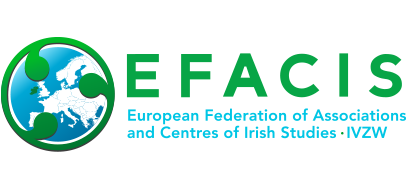The Twelfth Conference of EFACIS
28–31 August 2019 – University of Ljubljana
Second Call For Papers
Stage Irish
In Memory of Professor Werner Huber (1952–2016)
Professor of English and American Language and Literature,
University of Vienna (2005–2016)
Keynote Speakers
Ruben Borg (The Hebrew University of Jerusalem)
Anne Fogarty (University College Dublin)
Stefanie Lehner (Queen’s University, Belfast)
Guest Writers & Readers
Annemarie Ní Churreáin (Bloodroot, Town)
Mary O’Donnell (The Light Makers, Empire)
Jessica Traynor (Liffey Swim, The Quick)
Final reader TBC
The University of Ljubljana, in partnership with EFACIS and The Vienna Centre for Irish Studies, invites paper and panel proposals for an interdisciplinary Irish Studies conference in memory of Professor Werner Huber. The conference theme of ‘Stage Irish’ invites delegates to revisit and reconsider diverse modes of (mis)representing, performing, articulating, witnessing, constructing, and deconstructing ‘Irishness’. The time is ripe for such an inquiry. The Celtic Tiger and Brexit, the Marriage Equality referendum and the #Repealthe8th and #WakingTheFeminists campaigns compel us to turn to history and representation (in literature, drama, art, music, film, television, non-fiction, popular and digital culture) to reassess how ‘Irishness’ has been shaped and reshaped as a parochial, (inter)national, gendered, sexual, religious, artistic identity. This focus on the cultural, societal, historical, and political interfaces between performance, performativity, spectatorship, and identity in diverse Irish contexts reveals tensions between self-image and Othering, innovation and cliché, cultural production and negotiated reception. While the organisers welcome paper and panel proposals on any topic or discipline related to Irish studies, we are particularly interested in submissions that address the conference’s theme from a range of contexts and (inter)disciplinary perspectives, including (but not limited to):
- Representations and constructions of ‘Irishness’ across disciplines, genres, media, and platforms, from strange ‘Others’ to comic fools, from lower-class drunkards to nationalist archetypes, from the Celtic Tiger to the 2008 Crash, Brexit, and beyond
- Intersectional Irishness: Race, Class, Gender, Sexuality, Citizenship, Marriage, Bodily Autonomy, Migration, Critical Whiteness Studies, Waking the Feminists, Repeal the 8th
- Clichés, Stereotypes, Autostereotypes, Heterostereotypes, Essentialising, Stigmatising,Othering
- Performances in/of the Everyday: St Patrick’s Day Parades, Pub Crawls, Sports, Concerts, Newspapers, Religious Rites and Sectarian Riots, Political Theatre, Protests, Lecture Theatres, Digital and Social Media, etc.
- Genre: Comic & Tragic Passions; Musical Theory andPractice; Page, Stage and Screen
- Bearing Witness, Collective Memory, Kitsch, Folklore, Nostalgia, Cultural Mythology
- Masks, Pseudonyms, Fake Knowledge,Forgery, Irish Bulls, Role-Playing, Dissembling, Hoaxing
- Body Politics, Performativity, Desire, Embodiment, Gazing, Situated Cognition
- The Semiotics of Space, Movement, Costumes, Outfits, Uniforms, Sartorial Style, Objects, Props, Thing Theory
- Revisiting the Irish Comic Tradition: The Sacred & the Profane, the Carnivalesque & the Grotesque
- Circulation of Power, Containment, Subversion, Law, In/Justice, Structural Violence, Capital Punishment
- Reception Studies, Adaptation Studies, Cultural Refractions, Appropriations,Creative Receptions
The EFACIS conference is an interdisciplinary Irish studies event and welcomes submissions from all disciplines on any Irish Studies topic or theme. This conference is dedicated to the memory of the late Professor Werner Huber (University of Vienna) and draws inspiration from his pioneering interdisciplinary research interests and great contribution to the development of Irish Studies.
The conference will include a plenary roundtable session on the Aistriú translation project. Speakers include the Co-Directors of the Project Dr Rióna Ní Fhrighil (Project Director and Lecturer, Roinn na Gaeilge/Discipline of Irish, NUI Galway) and Dr John Caulfield (Communications Officer, NUI Galway), with Dr Seán Crosson (EFACIS President, and Vice-Dean Research, College of Arts, Social Sciences and Celtic Studies, NUI Galway), and more to be announced. For more details, see: http://www.nuigalway.ie/aistriu/
Abstracts and Submissions:
If you would like to propose a paper (not exceeding 20 minutes, approximately 2500 words), or panel (maximum 3 speakers) please submit your title and an abstract of 250 words accompanied by a short biographical sketch to: efacis2019@univie.ac.at
Deadline for abstracts: 5 April 2019
Conference Organisers:
Igor Maver (Head of the American Studies Interdisciplinary Doctoral Programme, Faculty of Arts of the University of Ljubljana)
Dieter Fuchs & Paul Fagan (Heads of the Vienna Centre for Irish Studies, University of Vienna)
NB: Only paid-up members of EFACIS are eligible to present papers at this conference. Membership subscriptions for EFACIS may be taken out or renewed with conference registration. Membership of EFACIS is €30 for individuals, €15 for graduate/postgraduate students and membership through institutional affiliation (institutes and research centres). To join EFACIS beforehand, please contact the EFACIS Treasurer, David Grant at davidgrant@leuveninstitute.eu or visit http://www.efacis.eu/site/page.php?doc_id=862
Werner Huber Travel Bursaries
EFACIS is offering four Werner Huber Travel Bursaries to the value of €200 each to postgraduate students who wish to participate in the EFACIS 2019 conference in University of Ljubljana. Please find information below regarding the documents required and criteria for assessing those who wish to be considered for a scholarship.
Documents required for consideration for EFACIS postgraduate scholarship
Conference proposal (following criteria outlined above) and CV
350 word document outlining reasons for applying for the EFACIS Bursary.
2 references from academic staff – one of whom should be your supervisor – in your home institution.
Please submit your abstract and bio via the EFACIS 2019 email address, efacis2019@univie.ac.at
Additionally, please send these documents together with your CV, references and 350 word document outlining reasons for applying for the EFACIS Scholarship to efacispres@gmail.com
Deadline for applications: 5 April 2019
Criteria for Assessing Postgraduate students for EFACIS Scholarship
(only EFACIS members may be considered for the postgraduate scholarship (15 Euro per calendar year))
1. Relevance to conference theme
2. Originality
3. Circumstances of student concerned
4. Standard of academic writing apparent in proposal
